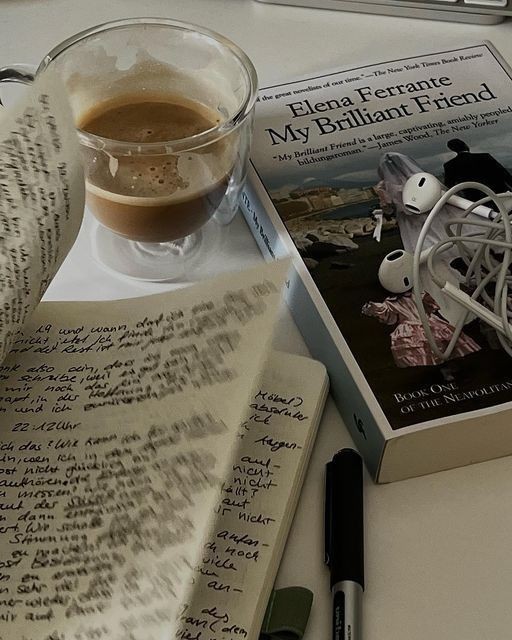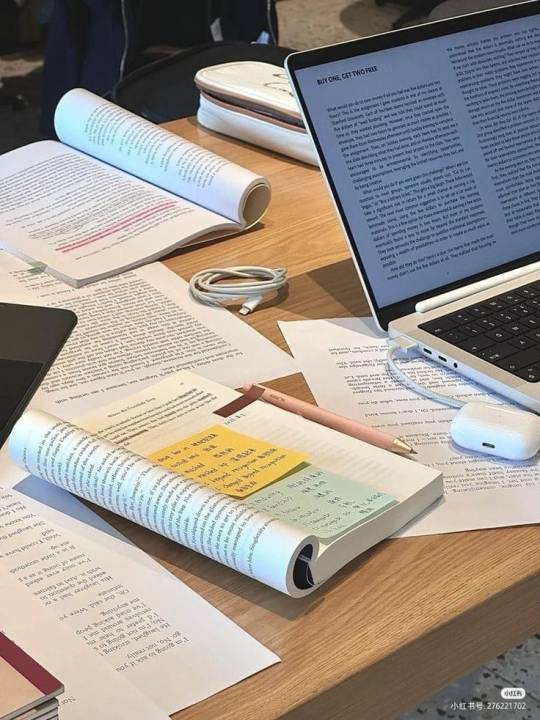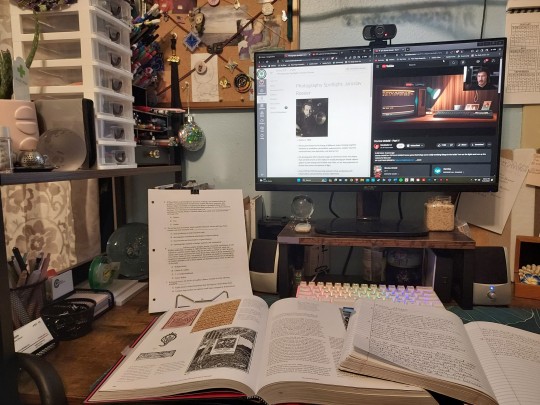#tips: habits
Text
ADHD tip: if u need to remember something, inconvenience urself with it.
works best with physical objects obviously but just. oh i keep forgetting my lunch box before work? now after prepping it i set it in front of the door so i cant leave without moving it. dont wanna forget to take my pills? well in about to eat dinner so im gonna set the pillbox down right where my plates gonna go. gotta deal with x before bed? well, ill set it on my bed so i cant sleep without moving it. make it so that u cannot proceed with another task without interacting with the forgetfullness object.
u can also sub in an object that maybe isnt the task itself but is a related reminder object (detergent for laundry, trash bag to replace bag when u throw out the damn trash, etc)
and not in the VICINITY of another task, like. the reminder object is On Top Of my game controller and i cant play video games without being reminded "oh i had TASKS".
#adhd#adhd tips#i dont do this very often but its helpful when i do and some of them are habits now#like the lunch kit. havent forgotten it in like a year!!
22K notes
·
View notes
Text
How To (Realistically) Make A Habit Of Writing
To clarify: Works with my autism. WORKS WITH MY AUTISM!!! I’ve been meeting my goals since I made them my New Year’s resolution! Anyway I’m so sick of all those ‘how to’ guides that don’t actually tell you what the process is they’re just like ‘just do it, but don’t burn yourself out, do what’s best for you!’ because you’re not telling me what I’m not supposed to be burning myself out over but okay, so I made my own. Hope this helps
1. Choose your fighter metric. What works better for you as a measurement of your progress; time spent writing or your word count? Personally I get very motivated and encouraged by seeing my word count go up and making a note of where it should be when I’m done, so I measure by that. At the same time, a lot of people are also very discouraged by their word count and it can negatively impact their motivation to write, and in that case you may be better off working from how much time you spend writing rather than where the word count is
2. Choose your starter Pokémon time frame. How often can you write before it starts to feel like a chore or a burden rather than something fun you look forward to? Many people believe that they have to write daily, but for some people this can do more harm than good. Maybe every two or three days? Weekly? Figure out what fits your schedule and go with it
3. Choose your funny third joke goal. Now that you’ve got your chosen time frame to complete your goal in, what’s a reasonable goal to aim to complete within that time frame based on the metric you chose? If your metric is your word count, how much can you reasonably and consistently write within your chosen time frame? If your metric is time spent writing, how much time can you reasonably and consistently spend writing within that time? Maybe 1000 words per week works, or maybe 10 minutes per day? The goal here is to find something that works for you and your own schedule without burning you out
4. Trial and error. Experiment with your new target and adapt it accordingly. Most people can’t consistently write 1667 words per day like you do in NaNoWriMo, so we want to avoid that and aim somewhere more reasonable. If you feel like it’s too much to do in such a short time frame, either give yourself less to do or more time to do it in. If you find yourself begrudgingly writing so often that it constantly feels more like a chore than something fun, maybe consider adapting things. And if you think that you gave yourself too much wiggle room and you could do more than this consistently, give yourself more of a challenge. Everything needs to suit you and your pace and needs
5. Run your own race. Don’t feel like you’re not accomplishing enough in comparison to others or not working fast enough to satisfy some arbitrary feeling of doubt. Everybody works at their own pace and slower work doesn’t mean worse work. You could be on one word per day and you’ll still see consistent results, which is still one word per day more than you could originally count on. All progress is progress, regardless of its speed
#habits#writing habits#writing#writers#writeblr#bookblr#book#writers on tumblr#writerscommunity#my writing#writers of tumblr#writer#how to write#on writing#creative writing#write#writers and poets#writblr#writer things#writing tips#writerscreed#writing is hard#writing advice#writing life#writer problems#writer stuff#female writers#queer writers#writersnetwork#writerblr
2K notes
·
View notes
Text




IF YOU GET TIRED, LEARN TO REST NOT TO QUIT
- Banksy
#studyblr#study#studyspo#studying#studyblr community#student#student life#aesthetic#books & libraries#books and reading#study aesthetic#study space#study blog#study inspo#studystudystudy#studyspiration#studyinspo#study habits#study hard#study notes#study motivation#studygram#study goals#study tips#100 days of productivity#bookworm#source: pinterest
2K notes
·
View notes
Text



study hard. no matter if it seems impossible. no matter if it takes time. wake up early and start studying for your future. just remember that the feeling of success is the best feeling in the world.
#academia#college#education#note taking#school#student#study aesthetic#study blog#study inspiration#study motivation#university student#architecture student#study notes#study tips#studyblr#studyinspo#studyspo#academic validation#chaotic academia#light academia#dark academia#architecture school#study hard#study habits#motivation#motivating quotes#uni life#university life#university
641 notes
·
View notes
Text
Femme Fatale Guide: Healthy Habits To Look & Feel Your Best Without Restriction or Unrealistic Routines
Realistic ways to maintain a healthy life/body/appearance (size and weight are all personal, not the most important metric – for certain). No diet culture or delulu-land tips here.
What I've done to maintain my 30-pound weight loss for over a decade, glowing clear skin (no pimples or discoloration, etc.), and super healthy, full & shiny hair, still living life and enjoying it – the mindful way.
Eat home-cooked meals & (plant-based) whole foods – 90-95% of the time
Incorporate at least 1 salad into my daily routine (either a large, hearty lunch salad or a simple green salad as a starter with dinner)
Include at least 1 fruit/vegetable in every meal or snack
Never restrict food groups – whole grains/potatoes, healthy fats, protein-rich plant foods, and produce are all essential to consume every day
Focus on meals, but have whole food snack options on hand to enjoy if genuinely hungry (mainly fruit, lupini beans, edamame, carrots/celery/cucumber with hummus, plain popcorn, handful of almonds/cashews)
Have breakfast after one coffee (before a second) and have dinner late enough (8-9:30 pm) to curb late-night hunger
Only have fruit and tea after dinner; Always stop consuming food at least 3 hours before bed for better sleep/digestion
Order whatever I want when going out to eat, but split dessert
Have at least one indulgent meal/dessert per week
No sugary cocktails – wine, champagne/prosecco, martinis, gin & tonic, margarita, French Connection, Sambuca, Grappa, tequila on the rocks, etc. are great options. Bellinis/fruit plus wine/spirits cocktails are a good middle ground. Sugary drinks worsen the hangover – big-time
Perceive healthy eating as a form of enjoyment, creativity, and nourishment, not restriction or deprivation (it's not if done liberally enough)
Consume a vitamin B12 and vitamin D supplement daily. Keep digestive enzymes on hand for when they're necessary
Always have a large glass of water first thing in the morning (before coffee) and by my side all day long
No soda, juices, sugary drinks, etc. Black coffee, tea, and water only on the daily – wine and no-sugar alcoholic drinks on rare occasions. Smoothies can be a great snack or breakfast, though!
Incorporate an (almost) daily walk into my schedule as a form of exercise and a mental health reset (I aim for 4-5 miles/10Kish steps per day on average)
Do short, low-impact strengthen training exercises 3x a week (15-30 mins each usually) for bone health & toning
Never forcing myself to do strenuous exercise/workout formally in a gym – it's not for me; it doesn't make me feel/look better and throws my hunger & energy levels way off. To each their own, though
Have a variety of playlists ready to go for waking up, working, dancing, walking/workouts, doing chores, and reading/relaxing
Internalizing that sexual health is a core aspect of your health & well-being – on all counts
Maintaining a simple skincare routine 2x per week with high-quality products and a couple of weekly treatments
Prioritizing my body care routine with as much as my facial skincare routine
Wearing at least SPF 30 daily
Exfoliating 2-3x per week
Learning what hair products work for my hair type; Using a deep conditioning mask and a scalp mask weekly
Using only cold water when washing my hair
Incorporating face & body massages into my weekly at-home routine
Using Uriage lip balm, hand cream, and deodorant religiously
Flossing 1-2 times a day/using an electric toothbrush
#healthy habits#healthy eating#health and wellness#health & fitness#health is wealth#skincare tips#haircare#self care#glow up era#self concept#femme fatale#dark feminine energy#dark femininity#it girl#high value woman#the feminine urge#high value mindset#female excellence#female power#queen energy#dream girl#femmefatalevibe#q/a
2K notes
·
View notes
Text
Ways to hit your readers in the gut
When it comes to writing, there's a profound and mesmerizing way to touch your readers deep within their souls. It's about crafting moments that hit them in the gut, stirring up intense emotions and forging an everlasting connection. Here are some techniques to help you achieve this:
1. Unexpected Loss: Introduce a character who captures hearts, only to snatch them away suddenly. Think of J.K. Rowling's "Harry Potter" series, where the abrupt departure of beloved characters like Sirius Black and Fred Weasley leaves readers shattered, their grief a testament to the power of storytelling.
2. Sacrifice for a Cause: Show a character willingly sacrificing their own happiness or even their life for a greater purpose. Suzanne Collins' "The Hunger Games" portrays Katniss Everdeen's selflessness, volunteering as a tribute to save her sister, evoking empathy and admiration.
3. Unrequited Love: Explore the agony of unrequited love, where hearts ache and souls yearn. Charlotte Brontë's "Jane Eyre" delves into the bittersweet and heart-wrenching tale of Jane's unfulfilled affection for Mr. Rochester, resonating with readers who have experienced the profound depths of unrequited longing.
4. Betrayal by a Loved One: Peel back the layers of trust to reveal the sting of betrayal. George R.R. Martin's "A Song of Ice and Fire" series delivers shocking betrayals that shatter readers' expectations, leaving them stunned and heartbroken alongside the characters.
5. Overcoming Personal Demons: Illuminate the struggle against internal conflicts, be it addiction, guilt, or haunting trauma. Anthony Doerr's "All the Light We Cannot See" explores Werner's moral compass during wartime, captivating readers as they witness his battle for redemption and personal growth.
6. Injustice and Oppression: Shed light on the injustices characters endure, igniting empathy and inspiring change. Harper Lee's "To Kill a Mockingbird" reveals the racial prejudice faced by Tom Robinson, awakening readers to the urgent need for justice and equality.
7. Parent-Child Relationships: Navigate the intricate tapestry of emotions between parents and children. Khaled Hosseini's "The Kite Runner" unearths the complexities of the father-son bond, evoking a myriad of feelings, from longing and regret to hope for reconciliation.
8. Final Farewells: Craft poignant scenes where characters bid farewell, whether due to death or separation. Markus Zusak's "The Book Thief" gifts readers with heartbreaking partings amidst the backdrop of World War II, leaving an indelible mark of loss and the fragile beauty of human connections.
9. Personal Transformation: Illuminate characters' growth through adversity, offering a beacon of hope and inspiration. Charles Dickens' "A Christmas Carol" narrates Ebenezer Scrooge's extraordinary journey from a bitter miser to a beacon of compassion, reminding readers that redemption and personal change are within reach.
10. Existential Questions: Delve into existential themes that provoke deep introspection. Albert Camus' "The Stranger" challenges readers to ponder the meaning of life through Meursault's detached and nihilistic worldview, prompting them to question their own existence.
With these techniques, you have the power to touch your readers' souls, leaving an indelible impression. Remember to weave these moments seamlessly into your narrative, allowing them to enrich your characters and themes. Let your words resonate and ignite emotions, for that is the essence of impactful storytelling.
#writing#writing tips#character development#writer on tumblr#writerscommunity#writer tumblr#writblr#writing advice#oc character#writing block#writing habits#writing help#writersociety#fanfic
1K notes
·
View notes
Text
Habits that changed my life for the better
I stopped joking about myself. It was mostly about suicide jokes (it was a decision that I made after the worst moment of my journey with depression, if I can call it that), but, really, it's about all self-deprecating stuff. It may be just jokes, but it stays in your brain.
Positive attitude. It's similar to manifestation, in a way, but in a... down to earth way, I guess. Thinking positively about stuff changes everything for me. Almost everything is simpler.
I deleted Twitter. It may be a different social media for everyone, of course - now probably TikTok for most - but, well, Twitter was where I spent long hours everyday. I started taking breaks from it about a year and a half ago and deleted it in August. It was hard - I loved the community there and I miss the daily updates from my fav fandoms, but it's for the best. I still can't explain how Twitter affected me but I do feel better since I stopped spending so much time there.
Taking vitamins. I didn't think it would really make a difference but it definitely did. The biggest surprise for me was vitamin C - my immune system has improved super quickly when I started supplementing it. I didn't even realise how bad it was before. Other than that, I take B complex, A+E (hair, skin), and iron (i tend to have a deficiency of it). (& D when it's winter).
Having a consistent skin care routine. It's calming and both doing the routine and seeing the effects make me feel better. (I do realise that many people have more demanding skin than me and searching for the right products can be frustrating and expensive. I'm just talking about my experience).
Other things that I think are worth mentioning:
Therapy - just a short explanation that I've been on therapy (with breaks) for about 6 years now. I've had social anxiety for most of my life, now still struggle with depression (and amnesia, actually) a bit, but what I wanted to mention here is that I learned a lot from it. It's obvious, but I just think it's important to pinpoint that I did not just learn how to think more positively and love myself by myself.
Exercising! - I still struggle to make it a habit, but when I actually do exercise regularly (I do pilates), I really feel better. It's worth it.
Hydration - same with drinking water. I really don't think I have to explain it in any way lol.
#habits#self care#self care tips#self love#daily habits#healing#growth#wellness#text post#it girl#that girl#health#self improvement#self development#this post has been waiting in my drafts for a while now and i thought that i'll finally publish it
273 notes
·
View notes
Text
How To Create New Habits✨
There is a trick you can learn if you are trying to establish new habits called habit looping. Habit loops are like the secret formula behind our everyday actions like brushing your teeth, going to the gym, or reaching for a snack. By breaking down habits into three simple parts, you can learn how to establish positive behaviors that become habits.
The three parts are: a cue/trigger, a routine/action, and a reward. The cue prompts the brain to start the routine, which leads to the reward, reinforcing the habit.
Cue/Reminder: Something tells your brain it's time to do the habit.
Action: You do the habit.
Reward: Your brain feels good because of the habit.
After a while your brain connects the cue, the action, and the reward. Eventually the habit becomes automatic and the cue alone can trigger the routine without much conscious thought. The reward reinforces the habit, making it more likely that you will repeat it.
Here’s an example:
Cue/Reminder: A time and date when you are committed to exercising.
Action: You change into workout clothes and go for a run.
Reward: After the run, you feel proud of yourself and more energized. You give yourself positive self talk for your accomplishment. Maybe you reward yourself by buying yourself a nice little incentive. Could be as easy as treating yourself to your favorite smoothie or buying a new workout set for next weeks workout.
Your brain will start associating those days or scenarios with going for a run, so you naturally feel like exercising when your workday ends. The key is to choose cues that naturally occur in your day or that you want to add to it. Make sure the reward reinforces the positive feeling associated with the habit.
#personal growth#personal development#personal improvement#atomic habits#routines#health and wellness#healthy lifestyle#self healing#self reflection#self love#self care#self help#self improvement#self development#glow up tips#level up journey#it girl#girlblogging#dream girl tips#dream girl journey#dream girl guide#lifestyle
481 notes
·
View notes
Text

figure studies but make em bunny boys as a treat!!!
#gonna try and get into the habit of doing more studies hopefully#did 2 sets of 10 before these but i think i get to draw some buns as a treat >:))))#studies are kinda boring so hot tip draw your faves in poses thatll show off their legs it's good motivation#obey me#omswd#obey me nightbringer#asmodeus#belphegor#asmo#belphie
228 notes
·
View notes
Text
20 Weight Loss Tips - Losing Weight Made Easy!
1. Drink 3+ liters of water daily.
2. Drink a glass of hot water with lemon and honey every morning on empty stomach.
3. Increase protein intake.
4. Get more fiber rich foods into your meals.
5. Switch to green tea instead of coffee.
6. Avoid junk foods.
7. Do cardio every single day.
8. Avoid the 3 white poisons: sugar, salt and rice.
9. Never skip your meals.
10. Reduce your food consumption.
11. Eat more watery and low calorie foods.
12. Choose sprouts as snacks
13. No more than 3 main meals per day.
14. Whenever possible, add honey, lemon, or cinnamon to your food.
15. Eat these fruits: watermelon, grapefruit, apples and blueberries.
16. Do some yoga.
17. Avoid crispy, creamy and cheesy foods.
18. Lift more weights.
19. Eat slowly and chew each bite of food.
20. Spend more time outdoors.
Follow few tips and stick with them and see the amazing results.
Thank you, Be fit and happy!
Read Next: Every Night 127,000 Women Use This Caribbean Flush To Burn Fat After Dark!
#tumblr#weight loss tips#lose weight tips#losing weight tips#healthy lifestyle#healthy weight loss#healthy habits#health & fitness#weight loss#lose weight#losing weight#fitblr#healthblr#fitness goals#motivation#gym#diet#exercise#nutrition#usa health#keto#calorie deficit#tips#tips & tricks#low cal#smoothies#trending#positivity#self care
3K notes
·
View notes
Text

#health and fitness#tumblr#fitblr#healthy living#healthy life changes#fit journey#health journey#health & fitness#weight loss journey#gettingstronger#gettinghealthy#healthy habits#weight loss tips#fit tips#benefits of exercise#exercise regularly
2K notes
·
View notes
Text
Writing Tip - What ‘Habit Over Motivation’ Actually Looks Like
We’ve all heard the writing advice that you can’t rely on motivation to get you through writing a book, sometimes you need to force yourself to do it and make a habit of it. And a lot of us will scoff at that or find it too restrictive or boring, it leaves us feeling like it’s a chore rather than a fun activity
As someone who only worked out what people actually mean by it recently, let me explain my take on it
You’re not always going to be inspired to write, you’re not always going to be motivated to write, but if you only write when you’re motivated it’s gonna take a crap ton of time - and writing anything to completion already takes donkey’s years as it is. Forming a habit is going to enable you to write consistently, and thus even unmotivated or uninspired progress is still made. Hence, sometimes you have to force yourself to write
But writing too much will make that habit impossible, or at least it becomes a chore and not a fun activity. You need to give yourself realistic goals to meet, even if it’s only something small. Write for ten minutes a day, write 500 words every week, any snail’s pace progress regardless of how insignificant it may seem. Something small enough that it doesn’t drain you but frequent enough that there’s still a habit being formed, there’s still consistency to it
I used to only write when I was inspired and motivated and could get myself to start writing, and even then the word count would be inconsistent. It could be weeks or even months between proper writing sessions. But now that I have a baseline for productivity, I have a baseline for consistent progress. And I’m only on 1K words a week! And if that doesn’t work, you can do less, or go by time spent writing if that’s a better metric for your writing style!
There’s no such thing as not enough progress when it comes to forming a consistent habit; if you can get at least one word per deadline (day, week, whatever) then that still counts as consistent progress
What everyone else seems to think of is “You must get this big amount of words written daily, think of it as eternal NaNoWriMo, if you miss even one day you’re a failure and you’ll never get the book done, SUFFER FOR YOUR ART!”
Just do what’s comfortable and it’ll be fine, no worries
#habits#writing habits#consistency#productivity#writing#writers#writeblr#bookblr#book#writers on tumblr#writerscommunity#my writing#writers of tumblr#writer#how to write#on writing#creative writing#write#writers block#writers and poets#writblr#writer things#writing tips#female writers#queer writers#writerscreed#writing is hard#writing advice#writing life#writer problems
513 notes
·
View notes
Text
Understanding study material 📚 Effective strategies 🤔
Here are some research-backed tips to help you navigate difficulties in understanding study material effectively 💪🏼
1️⃣ Break down complex concepts
Research suggests that breaking down complex concepts into smaller, more digestible parts can aid in understanding. Divide the material into manageable sections and focus on understanding each component before moving on to the next.
2️⃣ Engage in active learning
Active learning techniques, such as summarizing, teaching others, and practicing with flashcards, can improve understanding and retention. Engage actively with the material by explaining it to a study partner or testing yourself with practice questions.
3️⃣ Seek clarification
Don't hesitate to seek clarification from your instructors, peers, or online resources when you encounter difficulties. Research indicates that asking questions and seeking feedback can enhance understanding and fill in knowledge gaps.
4️⃣ Utilize visual aids
Visual aids, such as diagrams, charts, and graphs, can help simplify complex information and improve comprehension. Create visual representations of the material or use existing visual resources to enhance your understanding of challenging concepts.
5️⃣ Connect new material to prior knowledge
Research in cognitive psychology emphasizes the importance of connecting new information to existing knowledge for better understanding. Relate new concepts to familiar ideas or experiences to establish meaningful connections and improve retention.
6️⃣ Practice retrieval techniques
Research studies suggest that practicing retrieval techniques, such as self-testing and quizzing, can strengthen memory and understanding. Test yourself regularly on the material to reinforce learning and identify areas that require further review.
7️⃣ Collaborate with peers
Collaborative learning has been shown to enhance understanding and retention of study material. Engage in group study sessions with peers to discuss challenging concepts, share insights, and benefit from diverse perspectives.
8️⃣ Take breaks and manage stress
Take regular breaks during study sessions, practice relaxation techniques, and prioritize self-care to manage stress levels and optimize your cognitive performance. Read posts about mental and physical health to find more useful information.
#medicine inside#studyblr#study with me#study hard#study time#study desk#desk setup#study notes#studying#study inspiration#study tips#tips to study#medicineinside tips#tips for students#study habits#study method#studyinspo
124 notes
·
View notes
Text

Even though it is spring break, I am using this time to get ahead with school work. I feel like half of my time going to school is trying to balance life, work, and school. Any tips?
#study aesthetic#study motivation#studyspo#community college#school#study tips#new studyblr#study#study hard#study habits#student#student life#college life#college#artbook#photography#my desk
136 notes
·
View notes
Text
Femme Fatale Guide: Best Sleep Hygiene Habits & Tips For Better Sleep
Daytime Habits:
Stop drinking caffeine at least 8 hours before you want to go to sleep
Move daily: A 30-minute walk or a short pilates video is enough if that's all you can manage
Get some fresh air/natural light and/or supplement with vitamin D
Ensure you're getting adequate magnesium and vitamin B12 in your regular diet or through supplements
Nighttime Habits:
Tuck your phone in at its "bedtime": Leave your phone in the charger across the room. Out of sight, out of mind.
Have a physical book beside your bed to start reading at a certain time. Around 30-60 minutes before you actually want to go to bed. Find a book that puts you in a calm mood. A book that's too engaging will be counterproductive.
Have some "sleepytime" tea around 30 minutes before bed (Chamomile tea is a great choice. I love the Yogi Soothing Caramel Bedtime tea).
Limit the lights on for an hour or so before you want to go to bed. Only keep the light on near your bed if possible. Keep your curtains closed if necessary.
Practice deep breathing in bed: You can do a full 5-10 sleep meditation or just do a few sets of belly breaths (one hand on your chest and the other on your diaphragm or upper stomach)
Use meditation or a self-pleasure practice to relax enough to fall asleep.
To get on a proper sleep routine & fight insomnia:
Allow yourself one day to be exhausted, so you go to sleep "on time" and give yourself enough time to get (at least) around 6 hours of sleep. This helps your body "reset," at least for a few days.
When you close your eyes, picture one of your favorite memories and re-experience it without allowing other thoughts to enter your brain. This helps calm your mind, so you more easily drift off to sleep (I've been doing this for around 15-18 years and it's golden)
Have a journal or notebook with a pen by your bed: This allows you to write anything down that you forgot about or need to do, sudden inspiration that arises before you fall asleep, or a place to write out your feelings to help relax before going to sleep. It's better than having your phone and gives you no excuse to go pull it out.
Have a bottle of water by your bed, so you can have a few sips if you can't sleep from being (even a little) dehydrated.
#femme fatale#dark femininity#dark feminine energy#sleep tips#bedtime mode#bedtime routine#bedtime reading#healthy habits#it girl#queen energy#dream girl#that girl#wellness#sleep hygiene#female excellence#female power#the feminine urge#femmefatalevibe#healthyhabits#new habits#self improvement#self love#health and wellness#sleep well
932 notes
·
View notes
Text
Please, fic writers, take this to heart:
If this is the first time a character is shown to your reader, or if that character does not show any notable aspect of their personality for a while, then by all means refer to them as “the redhead”, “the brunette”, etc.
But I’m begging of you. When you’re having two characters in conversation, and they both know each other well, there is no reason to be calling one of them "the blonde". Especially not just to avoid saying their name again.
Nervous that using she and her will be confusing for the reader, when it’s two women? Just make it contextually clear. Use line breaks. Use actions to indicate it, pre-speech.
Because never ever do two intimate people think of each other such that they reduce them down to their hair colour. When you describe your partner, there’s no way the first thing you’d tell a person is the colour of their hair. I’d be willing to bet that’s one of the last things you’d mention, unless their hair was particularly striking, enough to find the person if you need to seek them in a crowd.
And don’t worry, their names are their names. It’s okay to use them. You won’t sound like Baby’s First Fanfic. Yes, it’ll take some practice to figure out the balance, but it’s worth it. Because the alternative is stripping a character of every meaningful thing you know about them, just to point and go “hair colour is different, that’s how you know”.
Heaven forfend there are two people with the same hair colour. Because then it becomes ‘the tall woman’ or ‘the freckled one’, on chapter 50 of people becoming deeply involved in each other’s existences.
Tune in next week, when I discuss how it’s okay to call a drink what it is, instead of referring to it as ‘[x]-coloured liquid.’
#fanfiction advice#writing advice#writing tips#There's so many ways to signify and you'll be so much happier once you can step away from this habit
2K notes
·
View notes